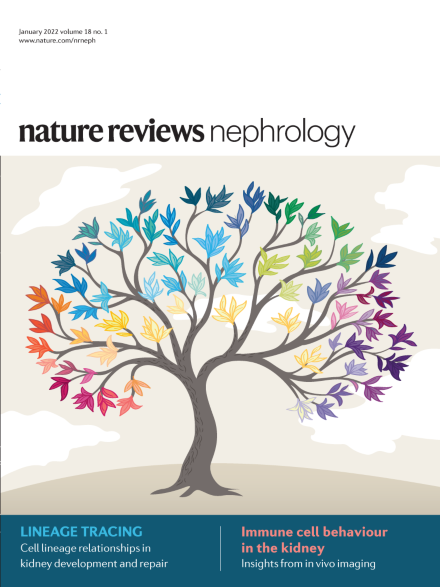Drivers and mechanisms of cognitive decline in chronic kidney disease
IF 39.8
1区 医学
Q1 UROLOGY & NEPHROLOGY
引用次数: 0
Abstract
Cognitive impairment is highly prevalent among individuals with chronic kidney disease (CKD). Despite its high prevalence, the contributing factors and mechanisms underlying brain–kidney dysfunction in CKD remain poorly understood. However, advances in neuroscience, including novel imaging techniques and cognitive assessment methods, have begun to clarify this complex relationship. Several factors contribute directly to cognitive decline in people with CKD, including accumulation of uraemic toxins, microvascular damage, malnutrition, chronic inflammation and disruptions in key neuroprotective pathways, such as those involving Klotho and the glymphatic system. These factors are also linked to the accelerated ageing observed in people with CKD, a key contributor to cognitive decline. However, most studies on cognition in people with CKD have been cross-sectional and associative, offering limited insight into causation. Research advances, such as studies on the effect of uraemic toxins on the blood–brain barrier and the role of the endothelial glycocalyx in vascular damage, offer promising new directions. Emerging data from longitudinal cohort studies are also enhancing our understanding of these processes, with potential implications for both the treatment of CKD-related cognitive decline and the broader issue of cognitive dysfunction in ageing populations. Here, we examine key mechanisms linking CKD to cognitive decline and consider potential therapeutic interventions. The prevalence of cognitive dysfunction among people with chronic kidney disease (CKD) is disproportionately high compared with that in the general population. This Review examines current evidence on key drivers of cognitive impairment in people with CKD, and highlights gaps in knowledge and potential therapeutic targets.


慢性肾脏疾病认知能力下降的驱动因素和机制
认知障碍在慢性肾脏病(CKD)患者中非常普遍。尽管发病率很高,但人们对 CKD 脑肾功能障碍的诱因和机制仍然知之甚少。然而,神经科学的进步,包括新型成像技术和认知评估方法,已开始阐明这种复杂的关系。有几种因素直接导致了慢性肾功能衰竭患者认知能力的下降,其中包括尿毒症毒素的积累、微血管损伤、营养不良、慢性炎症和关键神经保护途径的破坏,如涉及 Klotho 和甘液系统的途径。这些因素也与慢性肾功能衰竭患者的加速衰老有关,而加速衰老是认知能力下降的一个关键因素。然而,大多数关于慢性肾脏病患者认知能力的研究都是横断面和关联性的,对因果关系的了解有限。研究进展,如关于尿毒症毒素对血脑屏障的影响以及内皮糖萼在血管损伤中的作用的研究,提供了有希望的新方向。纵向队列研究中新出现的数据也加深了我们对这些过程的理解,对治疗与慢性肾脏病相关的认知功能下降以及老龄人口认知功能障碍这一更广泛的问题都有潜在的影响。在此,我们将研究慢性肾功能衰竭与认知能力下降之间的关键机制,并考虑潜在的治疗干预措施。
本文章由计算机程序翻译,如有差异,请以英文原文为准。
求助全文
约1分钟内获得全文
求助全文
来源期刊

Nature Reviews Nephrology
医学-泌尿学与肾脏学
CiteScore
39.00
自引率
1.20%
发文量
127
审稿时长
6-12 weeks
期刊介绍:
Nature Reviews Nephrology aims to be the premier source of reviews and commentaries for the scientific communities it serves.
It strives to publish authoritative, accessible articles.
Articles are enhanced with clearly understandable figures, tables, and other display items.
Nature Reviews Nephrology publishes Research Highlights, News & Views, Comments, Reviews, Perspectives, and Consensus Statements.
The content is relevant to nephrologists and basic science researchers.
The broad scope of the journal ensures that the work reaches the widest possible audience.
 求助内容:
求助内容: 应助结果提醒方式:
应助结果提醒方式:


